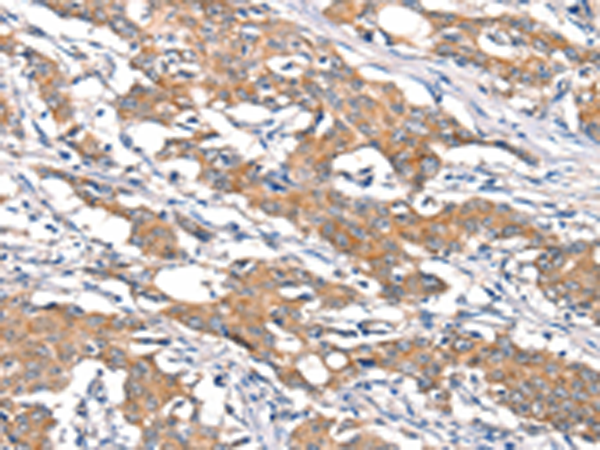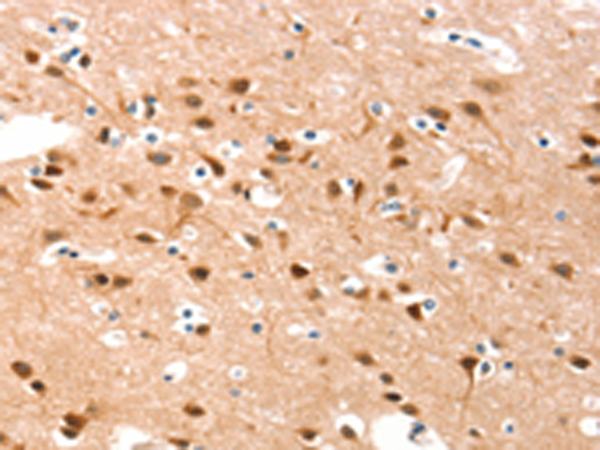

| WB | 咨询技术 | Human,Mouse,Rat |
| IF | 咨询技术 | Human,Mouse,Rat |
| IHC | 1/50-1/200 | Human,Mouse,Rat |
| ICC | 技术咨询 | Human,Mouse,Rat |
| FCM | 咨询技术 | Human,Mouse,Rat |
| Elisa | 1/2000-1/5000 | Human,Mouse,Rat |
| Aliases | CDHF1; DG2/DG3 |
| Host/Isotype | Rabbit IgG |
| Antibody Type | Primary antibody |
| Storage | Store at 4°C short term. Aliquot and store at -20°C long term. Avoid freeze/thaw cycles. |
| Species Reactivity | Human, Mouse |
| Immunogen | Synthetic peptide of human DSC1 |
| Formulation | Purified antibody in PBS with 0.05% sodium azide and 50% glycerol. |
+ +
以下是关于DSC1抗体的3篇参考文献概览(注:部分内容基于领域内典型研究方向,作者和标题为示例性描述,具体文献需通过学术数据库核实):
---
1. **标题**:*Autoantibodies against desmocollin-1 in pemphigus vulgaris*
**作者**:Amagai, M. et al.
**摘要**:本研究揭示了DSC1抗体在寻常型天疱疮患者中的致病作用,通过免疫沉淀和体外实验证明DSC1自身抗体会破坏上皮细胞间黏附,导致皮肤水疱形成,为天疱疮的免疫病理机制提供了新证据。
2. **标题**:*Desmocollin-1 as a prognostic biomarker in gastric cancer*
**作者**:Chen, X. et al.
**摘要**:通过免疫组化分析胃癌组织中DSC1蛋白表达,发现DSC1表达缺失与患者不良预后显著相关。研究利用特异性DSC1抗体证实其可作为潜在肿瘤抑制因子,为胃癌治疗提供新靶点。
3. **标题**:*Development of a monoclonal antibody targeting DSC1 for epithelial barrier research*
**作者**:Chidgey, M. et al.
**摘要**:该研究成功制备了高特异性抗DSC1单克隆抗体,并验证其在皮肤和口腔上皮组织中的定位功能。抗体被用于探究DSC1在细胞间连接中的作用,揭示了其在维持屏障完整性中的关键性。
---
如需具体文献,建议通过PubMed或Google Scholar以“DSC1 antibody”“desmocollin-1”等关键词检索最新研究。
**Background of DSC1 Antibody**
The Desmocollin 1 (DSC1) antibody targets DSC1. a member of the desmocollin family, which are transmembrane glycoproteins essential for cell-cell adhesion in desmosomes. These junctional complexes provide structural integrity to tissues exposed to mechanical stress, such as skin and cardiac muscle. DSC1. encoded by the *DSC1* gene, is predominantly expressed in stratified epithelia, particularly the upper layers of the epidermis, and plays a critical role in maintaining epidermal homeostasis and barrier function.
DSC1 has gained attention in dermatology and cancer research due to its dysregulation in skin disorders (e.g., psoriasis, pemphigus) and malignancies (e.g., squamous cell carcinomas). Antibodies against DSC1 are vital tools for studying desmosomal adhesion dynamics, tissue differentiation, and disease mechanisms. In autoimmune contexts, anti-DSC1 autoantibodies may contribute to blistering diseases by disrupting desmosomal integrity.
Additionally, DSC1 is explored as a diagnostic or prognostic biomarker in cancers, where its altered expression correlates with tumor progression. Research-grade DSC1 antibodies enable immunohistochemical detection, Western blotting, and functional studies, aiding in unraveling its role in cell signaling beyond adhesion, including apoptosis and proliferation pathways. Recent studies also highlight its potential as a therapeutic target in personalized oncology and inflammatory skin conditions.
×